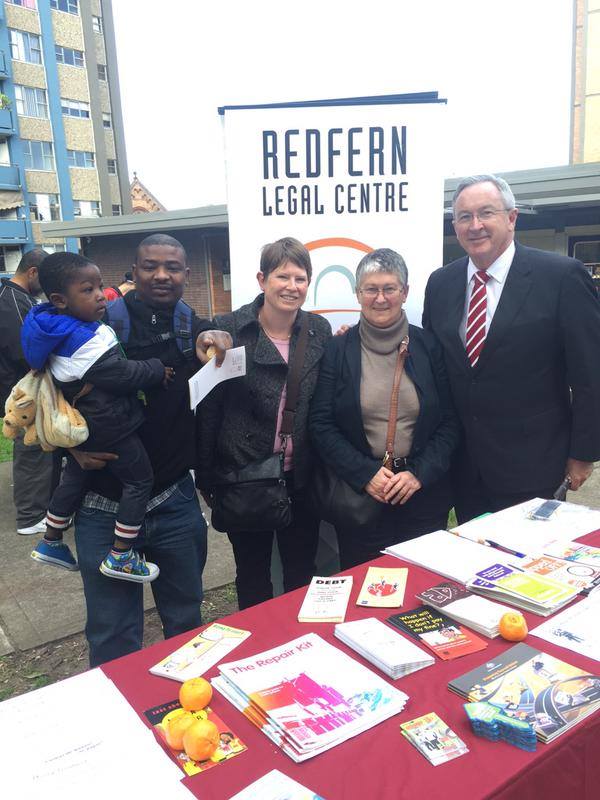The clinic is part of the NSW Department of Family and Community Services’ (FaCS) RedLink Outreach Service, first developed in 2014. RedLink brings together a range of community service providers including health, legal, social, and housing services – into one local service hub to improve the health and wellbeing of residents in social housing in Redfern by providing wrap-around services within the community.
 |
| Above (L-R): Redfern residents with RLC tenancy advocate Kimberley Mackenzie, RLC principal solicitor Elizabeth Morley, and NSW Minister for Social Housing Brad Hazzard. |
With more than 1500 residents, the Redfern Towers are the most concentrated public housing estate in NSW; for this reason, RedLink is headquartered at the McKell Building on Walker Street, Redfern.
By focusing on early intervention wherever possible, RedLink aims to break the cycle of disadvantage, tackling complex, entrenched problems such as intergenerational disadvantage, debt stress, social isolation, and alcohol and drug dependence.
RedLink includes a variety of weekly activities. On Tuesdays, a legal clinic is staffed alternately by solicitors from RLC and Legal Aid NSW. Solicitors help clients with a range of complex legal issues, including tenancy matters, the inability to pay fines, and matters related to employment, and discrimination.
These formal advice clinics are supplemented by a weekly morning tea. Held in a café every Friday, these gatherings have a more relaxed community atmosphere, allowing residents to get to know each other and to speak with the RedLink team in a more informal setting. These informal encounters help build trust and confidence in the program, making it easier for community members to attend the more formal clinic sessions.
Many problems, including those of common or ‘everyday’ occurrence, have legal remedies or contain legal issues. RedLink solicitors also help clients, community workers, and Housing NSW staff to identify legal issues.
A civil lawyer also frequently attends RedLink’s weekly community morning tea, alongside some of the social workers and medical staff, and the team are available for chats and referrals during this time.
The clinic’s civil law practice helps resolve diverse legal problems that impact on people’s everyday lives. These include debts, unpaid fines, Centrelink disputes, employment problems and more.
The most common issues the clinic assisted clients with including housing and tenancy, consumer credit and debt, and work development orders (WDOs).
The clinic includes a WDO team, who help eligible clients with unpaid fines to clear their debt by undertaking approved WDO activities, such as mental health treatment, drug or alcohol treatment or a life skills course. The team locate appropriate WDO sponsors and connect clients with those services.
Case study: Roy's* story
Roy was an Aboriginal man who was regularly seen around Poets Corner. He was referred to the Redlink Law Clinic in late 2015 and attended with his social worker who was assisting him to get support.
He had received a warning letter from his public housing provider regarding unauthorised occupants, high numbers of visitors, verbal abuse towards security staff, intimidating neighbours, vandalism and anti-social behaviour. The public housing provider were close to issuing a notice of termination to end his tenancy.
Supported by the social worker, the solicitor discussed the issues with Roy as well as the serious threat to his tenancy he was facing. Roy had been homeless himself and found it difficult not to allow other homeless people to stay at his house. He felt that he needed support to stop this as well as to get rid of the unauthorised occupant.
After discussing the matter with Roy and his support worker, he agreed that it would help him to be moved to another inner city area that was away from Poets Corner. This would also help him to evict the unauthorised occupant.
Working with the social worker was a tremendous support as she assisted Roy to get involved in other types of social activities, undergo rehab and attend both his health and legal appointments.
Roy was then moved into a permanent tenancy in another inner city area, was able to improve his health, and greatly reduced his alcoholism. He also participated in positive social activities as an Aboriginal leader.
This case study is just one of many that shows the benefits, of health and legal services working together to support vulnerable people, government departments and the community generally.
* Name has been changed.


